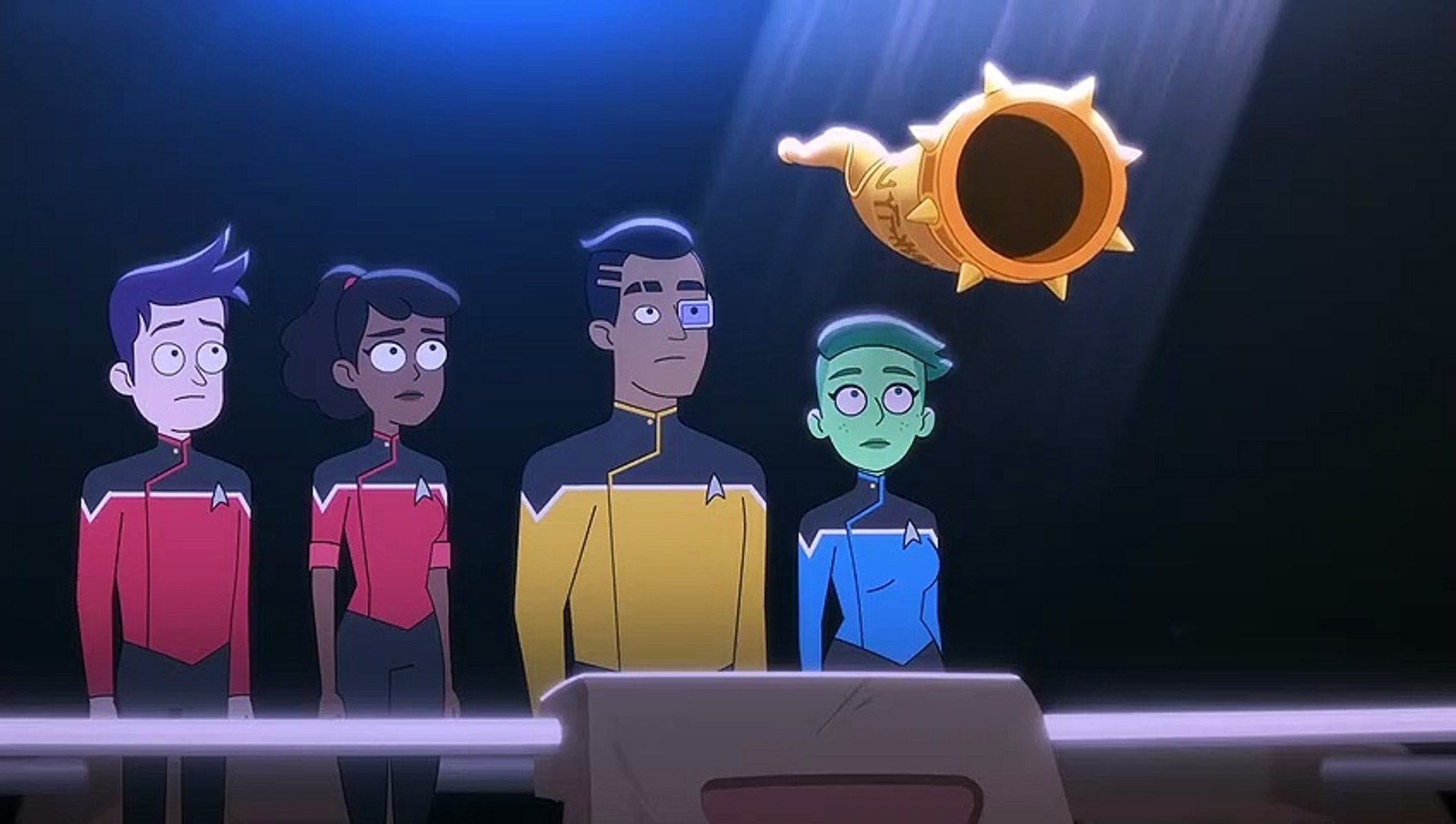What to Watch Verdict
This episode feels like it might have been the result of a monkey’s paw wish gone wrong.
Pros
- +
🖖🏻The ensigns are on equal narrative footing!
- +
🖖🏻The vignettes that make up the story have consistently great gags.
Cons
- -
🖖🏻The plot structure is designed to troll the audience.
- -
🖖🏻How the hell do you waste a John De Lancie cameo?
“Veritas” feels like it might have been the result of a monkey’s paw wish gone wrong. Technically, it delivers on some things that I’ve wanted Star Trek: Lower Decks to follow through on since it started. I’m happy to see an episode that embraces a single narrative that doesn’t split the focus across multiple competing plotlines, even if it takes a vignette structure to do so. It's nice to see Rutherford (Eugene Cordero) and Tendi (Noël Wells) get space to shine. It's great that this episode doesn’t center Mariner (Tawny Newsome) or Boimler (Jack Quaid) as the de facto protagonist. These all seem like they should be welcome changes of pace for what I’ve seen as the show’s biggest problems in its priorities. However, “Veritas” is attempting something a bit more subversive that necessitates these changes in the short term, doesn’t really signal an intent to reprioritize in the long term, and frankly doesn’t come together in a satisfying way. At least the episode is still funny.
The cold open finds our four main characters thrown into what appears to be an alien dungeon, completely absent of explanation. As the floor rises and elevates the ensigns to a new environment, they are placed in a dark chamber with a sinister alien interrogator while Captain Freeman (Dawnn Lewis) and the other officers hover nearby, stoically contained in a stasis beam. The interrogator demands that the ensigns testify as to the events of the last few days, and each unsatisfactory narrative places an ensign in danger of being dropped in a tank of ravenous eels.
First up is Mariner, who recounts how the ensigns missed a ship-wide red alert signal, forcing her and Boimler to sneak onto the bridge without having any idea what’s going on. Captain Freeman seems to have returned from an alien ship with a map of the Neutral Zone, but the aliens are upset with her expression of gratitude in a peaceful exchange. Boimler, when asked his opinion on what they should do without the pressure of wrong answers, absolutely and repeatedly gives wrong answers. It’s an obviously silly sketch that punctuates on Mariner messing up just as bad, misinterpreting the Captain’s peaceful (and painfully vague) order to show them what Starfleet is made of as a command to fire.
Next up to testify is Rutherford, who gets roped into a covert mission with Lieutenant Shaxs (Fred Tatasciore), only to pass out for large portions of it as his cyborg operating system updates and reboots, causing him to go into autopilot. This leads to a nonsensical series of events that force a bewildered Rutherford to perform a distracting fan dance, navigate across an invisible Klingon Bird of Prey, and get mauled in a Gorn wedding. The absurdity of these vignettes are ridiculous in all the right ways — the fan dance sequence is particularly funny as a guard blatantly points out how distracting Rutherford is — but this ultimately makes for a microcosm of the episode’s larger problem.
The final vignette is from Tendi, who was cleaning the conference room only to be roped into Commander Jack Ransom’s (Jerry O’Connell) covert mission under the misconception that she’s codenamed “The Cleaner.” Though it’s funny to see Tendi completely out of her depth on a mission to reclaim a mysterious package on a Romulan ship, the main comedic thrust of this act is the writers seeing how many ways they can censor dialogue under the pretense of classified information. Is it an overused sitcom gag? Yes. Is it used well here? Also yes.
The episode comes together with Boimler deconstructing the thesis of the entire show, explaining to the interrogator that lower decks ensigns aren’t told anything important and that the holes in their stories aren’t going to shed any light on the exploits of the so-called infallible heroes of Starfleet. The punchline here is that the officers were never on trial, that the interrogator was actually an ambassador that was trapped in the box Tendi helped procure, and that this whole production was actually a party the ambassador was throwing to record the heroics of his rescuers. It’s a fun gag in theory, but it fails a logistical sniff test once you think about it too long.
The episode goes out of its way to lampshade the ensigns’ confusion over how the disparate pieces of their narratives, and the absurdly threatening nature of the ambassador’s party, tie together into a cohesive whole. Captain Freeman’s promise of clarity is met with Boimler and company pointing out numerous plotholes that the frustrated Freeman dismisses. Essentially, the writers are here admitting that they came up with funny scenarios that could be tied together into a loose series of vignettes, but they didn’t have any interest in telling a story deeper than telling the audience they were fools for expecting a story. The nonsense may be the point, but it makes the episode feel disposable, like the twenty minutes you invested in it were wasted, even though it was enjoyable at the moment.
The latest updates, reviews and unmissable series to watch and more!
“Veritas” isn’t a bad episode due to its disdain for its audience. There are plenty of funny moments to sustain the episode as a collection of vignettes. But I think my annoyance is best encapsulated when it ends with a cameo from John De Lancie reprising his role as Q, only for the bit to be completely inconsequential and a waste of De Lancie’s talents. You can do better than troll me, Star Trek: Lower Decks. Please don’t make this a habit.
Star Trek: Lower Decks is available to stream now on Paramount Plus in the US and on Prime Video in the UK.
Leigh Monson has been a professional film critic and writer for six years, with bylines at Birth.Movies.Death., SlashFilm and Polygon. Attorney by day, cinephile by night and delicious snack by mid-afternoon, Leigh loves queer cinema and deconstructing genre tropes. If you like insights into recent films and love stupid puns, you can follow them on Twitter.


